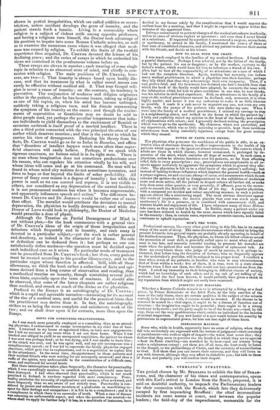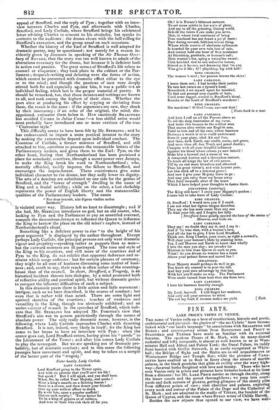ME. STERLING'S STRAFFORD.
THE period chosen by Mr. STERLING to exhibit the fate of Suter- FORD, and the character of his times and contemporaries, opens with this Earl's arrival in London from the North, prepared, it is said on doubtful authority, to impeach the Parliamentary leaders for their connexion with the Scotch, which fate they dexterously escaped by first impeaching Strafford : the chief intermediate incidents are some scenes at court, and between the popular leaders ; the field-day of the impeachment, memorable for the
appeal of Strafford, and the reply of Pym ; together with an inter- view between Charles and Pym, and afterwards with Charles, Strafford, and Lady Carlisle, where Strafford brings his celebrated letter advising Charles to consent to his attainder, but speaks its contents to the audience: the drama closes with the bell tolling for Strafford's execution, and the group usual on such occasions.
Whether the history of the Earl of Strafford is well adapted for dramatic poetry, may be questioned ; not merely for a reason in- cidently given by JOHNSON in speaking of the Sir Thomas Orer- bwy of SAVAGE, that the story was too well known to admit of the alterations necessary for the drama, but because it is deficient both in action and passion. The great scenes of Strafford's life relate to counsel or eloquence ; they took place in the cabinet or the Par- liament; despatch-writing and debating were the forms of action, which cannot be presented with dramatic effect either to the eye or to the mind; and though the passions of men were deeply stirred both for and especially against him, it was a public not an individual feeling, which last is the proper material of poetry. It should be remarked, too, that these debates and writings are known to all, and rank among the highest of their class. Whether the poet aims at producing his effect by copying or deviating from them, the result is the same : if the arguments are new, they shock by their inaccuracy ; if an echo of the original, the mind, dis- appointed, estimates them below it. How cautiously SHAKSPERE has avoided CICERO in Julius Casa?. l—a less skilful artist would most probably have introduced one or more orations of the true
' Ciceronian style."
This difficulty seems to have been felt by Mr. STERLING ; and he has endeavoured to impart a more poetical interest to the story by making the catastrophe depend upon individual conduct. The Countess of Carlisle, a former mistress of Strafford, and still attached to him, contrives to procure the treasonable letters of the Parliamentary leaders, and gives them to the Earl: Pyrn, on the other hand, finding that Northumberland has been promised a place for somebody, contrives, through a secret power over Jermyn, to make the King break his word to Northumberland ; who, mortally offended, tacitly imputes the failure to Stratford, and encourages the impeachment. These contrivances give some individual character to the drama, but they sadly lower its dignity. The arts of a demirep are substituted on one side for the genius of Strafford, and the "tower of strength" dwelling in the name of King and a feudal nobility; while on the other, a lost clerkship represents the power of English liberty and the statesmanlike qualities of the Parliamentary leaders. The canon
"Nec deal intersit, nisi dignus vindice nodes Incidmit,"
iti-violitted-every way. History left no knot to disentangle ; and if she had, Mr. STERLING introduces no god, but an old usurer, who, looking to Pym and the Parliament to pay an unsettled contract, compels the necessitous Jermyn to influence the Queen to influence the King to bestow the place on the old miser's nephew, instead of Northumberland's client.
Something like a deficient power to rise " to the height of his
great argument " is displayed by the author throughout. Except perhaps Lady Carlisle, the principal persons not only want dramatic vigour and propriety—speaking rather as puppets than as men— but the outward manners are ill portrayed. The tone and style of the King to his courtiers, and still more of the courtiers and of Pym to the King, do nut exhibit that apparent deference and re- straint which usage enforces: but for certain phrases of ceremony, they might be all men of business discussing some matter of busi- ness ; and, sooth to say, their reach is often rather of the counting- house than of the council. In short, Strafford, a Tragedy, is an historical incident thrown into dialogue, by a mind possessed both of reflective ability and poetical spirit, but without dramatic genius to conquer the inherent difficulties of such a subject.
In this dramatic poem there is little action and little movement : intrigue, such as we have described, is the source of conduct ; but even that is rather told than acted. There are some light and spirited sketches of the courtiers ; touches of weakness and versatility in the King, though too obviously exhibited ; and an under-current of remark in the speeches of Strafford, which indi- cate that Mr. STERLING has adopted Mr. FORSTERS view that Strafford's aim was to govern patriotically through the means of absolute power. 'I'be only really dramatic scene, however, is the following, where Lady Carlisle reproaches Charles with deserting Strafford. It is not, indeed, very likely in itself; for the King has come to her house to have an interview with Pym : when the orator goes out, Lord Strafford enters, having given his " parole" to the Lieutenant of the Tower ; and after him comes Lady Carlisle to play the termagant. But we are speaking not of dramatic pro- bability, but of dramatic conduct ; and in this sense the following passages have movement and spirit, and may be taken as a sample of the better part of the " tragedy."
Enter hastily Lady Carlisle.
LADY CARLISLE.
Lord Strafford going to the Tower again,
And with no promise that you'll save his life! Not speak ? But I will speak, and you shall hear. What, Sir, be called Your Majesty, and quake! Wear a king's mantle on a fainting bosom I Strut in a crown, and then desert your friends! Give up your noblest officer to death By a vile fate, upon a popular scaffold] dut on such royalty 'Twere better far To be a king of gypsies or of robbers, And true to those who risk their all for you.
Oh ! it is Nature's bitterest sarcasm To set mean spirits in her seats of glory, And say to all the grinning, hissing world, Behald the rulers 1 can make you serve. Man, in whose total continent of being True manhood has not found a jot of room; Poor doting coward, faithless trivial thing, Whose whole reserve of obstinate sullenness Is boarded for your own vain lust of rule, And cannot hold one hour of firm resistance At friendship, gratitude, or honour's call; Mere woman's fan, aping a masculine sword ; Thin kerchief tied to one seductive bosom, Stirred as it heaves, and dreaming that 'tis you Who give it life ; 0 I plaything, big with hell!
RING CHARLES.
The woman 'a mad ; her passion braves the skies!
LADY CARLISLE.
I brave them not; I but invoke their justice To rain hot curses on a tyrant's bead. Henceforth I set myself apart for mischief, To find and prompt men capable of bate, Until some dagger, steeled in Strafford's blood, Knocks at the heart of Strafford's murderer !
RING CHARLES.
His murderer ! 0 Gad !—no, no—not that !
[ Sinks back in a seat.
LADY CARLISLE.
And here I call on all the Powers above us To aid the deep damnation of my curse, And make this treason to the noblest man That moves alive within our English seas, Fatal to him and all his race, whose baseness Destroys a worth it ne'er could understand. Stars in your glory, vital Air and Sun, And thou, dark Earth, our cradle, nurse, and grave, And more than all, tree Truth and penal Justtm., Conspire with all your dreadful influence Against his blood whose crimes ye now behold ! Make him a byword and a name of wo, A conquered warrior and a throneless outcast, To teach all kings the law of evil power, Till by an end more friendless and abhorred Than his great victim's, and with heavier pain, Let him slink off to a detested grave!
And now I give your Majesty leave to go ; And may you carry from my house away That fixed incurable ulcer of the heart Which I have helped your thoughts to fasten there.
STRAFFORD (entering).
The King still here! I crave your Majesty's pardon ; I came but to take leave of Lady Carlisle.
RING CHARLES.
0, Strafford! I would save you if I could. I am not what her tigress tongue describes. They say she has more cause than soy one To wish our life, and I forgive her folly.
[Strafford leans quietly against the base of the statue of
Minerva, and looks on.
LADY CARLISLE.
They say ! no doubt they say it, and I say it : And if "tis true that, with a woman's love, And all she has to give, I love Lord Strafford,
Think not, King Charles, your sneer, so right a coward's,
Will clear your honour's blots by staining mine. Yes, I call Heaven and Earth to know that wholly 1 love the man you slay ; am prouder far Mistress to him than Queen to such as you.
What ! do you dream no woman has a heart Above your pedant forms and sacred lies ?
STRAFFORD.
Your Majesty would perhaps do well to go. You know my counsel is to pass the bill, And buy your own advantage by this loss. With her you'll make no way. The Parliament Were easier turned from bate than she from love.
LADY CARLISLE.
1 bate his baseness heartily enough.
KING CHARLES.
My Lord, farewell. I will forget her madness, And only call your services to mind.
'Tis not my fault if treason makes me yield. [Exit.



























 Previous page
Previous page